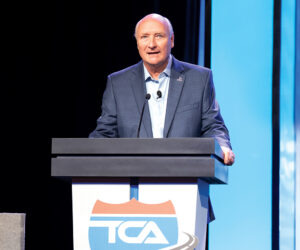In his acceptance speech during the Truckload Carriers Association’s (TCA) Virtual Spring Business Meetings in April 2021, Chairman Jim Ward said his 43 years in the trucking industry had led to a lifetime of transportation experiences. He also spoke about the rewards and challenges associated with them those experiences, including time spent as a TCA Officer and member. “I have experienced the platform that membership to this great organization offers,” he shared during his virtual speech. “In my time as a member, an officer and now, your incoming chair, justifying the dues to TCA was a simple endeavor. There is tremendous value in being associated with like-minded people who are dealing with similar situations.” Unbeknownst at that time, his stature as a leader of those like-minded TCA members would be extended to another level since at the conclusion of Truckload 2022: Las Vegas Ward will become president of TCA, taking over for John Lyboldt, who announced his retirement late last year. In his final Chat with the Chairman, Ward recounts the accomplishments of his tenure, addresses the Biden administration’s efforts to improve the infrastructure, and in a traditional gesture, offers encouragement to incoming TCA chair John Elliott.
Mr. Chairman, thank you for joining us for the last of your Chat with the Chairman interviews. Your term was extended for a few months because of the events surrounding the COVID-19 pandemic but has nevertheless gone by quickly. What have been TCA’s major accomplishments during your term?
It has been exciting to observe firsthand the members, officers, board, committee chairs, and staff all working together for a better TCA. We have continued to experience greater member participation in our educational offerings, while the engagement of our committees that guide TCA policy has improved. Most importantly, elevating the TCA story has certainly become a priority. I am very proud of the progress we have made. In my life journey, it has become clear that most things in life are about timing and we (Starla and I) have been very blessed to serve as TCA chair at this time.
What achievement or achievements make you the proudest?
The most satisfaction I have received in my career has been watching people I work with grow and excel at what they do. This past year, it has been exciting to see what the TCA staff has been able to accomplish under some very difficult and challenging circumstances. Their successes include coordinating and delivering a successful September annual meeting and then turning around six months later to deliver our 2022 meeting. It also includes retaining (89%) and recruiting membership (plus 13%); delivering countless quality educational webinars to aid members in the growth and development of their staff; holding one of the most successful Safety & Security Division meetings that we have experienced in over a decade; and coordinating and communicating countless articles on timely industry topics. Everyone deserves kudos for a “Job Well Done!”
What has been your biggest frustration?
I am an optimist by nature and thought COVID would have been in the rearview mirror by now, but the uncertainties surrounding it — and the issues confronting our industry because of it — continue to drag on. Other than that, I believe we have had a busy and fruitful year.
In addition to your chairmanship, what has been your view of the association during the time you spent as an officer?
The TCA membership is an incredible group of businesspeople who desire to see the industry and their business, as well as the association, grow and prosper. Watching them engage and interact with each other while sharing best practices and providing knowledge on topics such as operations, leadership, cybersecurity, safety and security, and succession planning, is encouraging and tells me we have a great future ahead of us.

As you complete your term, the transportation industry and the motoring public are anxious to see work begin in earnest on implementing of the $2 trillion infrastructure plan passed by Congress. In mid-January, the Biden administration said that since the president signed the law in November, the administration has “hit the ground running” to deliver results. What signs of progress have been visible to the trucking industry?
I think we all know the impact the infrastructure bill has on our industry, from paving the way to new roads to requiring new technologies for fleets to improve upon on our safety performance. That being said, the administration is moving forward on plans to expose our industry to potential truck drivers right out of high school, a demographic we have not traditionally recruited from for interstate commerce. Paired with an apprenticeship program spearheaded by the DOL, it appears the administration is pushing this forward quickly to help ease the supply-chain crisis and open up some quality jobs to a demographic that may not have realized what a future they could have in trucking. The administration also released its new National Roadway Safety Strategy in an effort to improve the safety record on our nation’s highways (not surprising as the technology included in the strategy was also part of the infrastructure bill that was passed through Congress). Safety improvement tools such as automatic emergency braking (AEB), lane-departure warning systems, and strengthened rear underride protection devices were all included in this strategy. The good news is that the majority of TCA members have already invested in this equipment to improve upon their safety performance; however, the strategy behind this program would require all fleets across the country to make these investments.
For the trucking industry, what are the three priorities that need to be addressed first?
The most important priority that needs to be addressed is the funding itself. Certainly, the accolades of getting the bill passed are justly due, but without an appropriations bill to define how those dollars are spent it could be much ado about nothing. It is a lot like following a recipe in a kitchen. Yes, we have all the tools and ingredients that go into making the meal — but without the recipe, we are somewhat lost in getting to the final product. The same can be said for the appropriation bill. Without its spending guidance, states may have to delay some of their critical projects until the dollars can flow through to them.
Spending $2 trillion on infrastructure is a wonderful beginning, but how important will it be for future administrations to systematically pass infrastructure legislation to sustain any momentum generated by the Biden bill?
Great question, and you are right — $2 trillion is a great start, but sustainability is what establishes continued excellence and prevents us from returning to where we are now. As a nation, our infrastructure is the very foundation on which everything else is built. Future administrations must acknowledge this fact by continually investing in a nation that is so reliant on the goods our industry hauls. Eventually, thinking long term, pricing will once again outweigh the dollars that are collected, which is why we have certainly advocated for indexes to the fuel tax annually. Now, with the focus on vehicle electrification, TCA has been involved in programs designed to explore the feasibility of a vehicle miles traveled (VMT) tax. We have certainly highlighted the problems that could be associated with such a program, but dedication to finding a long-term solution is what this industry and our nation needs.
Citing the importance the trucking industry plays in the American economy, the Biden administration last December rolled out the Trucking Action Plan, pledging to help during one of the most challenging times ever for the nation’s supply chain. What are some of the highlights of the plan?
The most important issue, right from the start, is the pilot program for 18- 20-year-old drivers to operate in interstate commerce. This provides our industry with the opportunity to expose that demographic to a career choice that may not have previously existed for them. Streamlining the process to obtain a CDL should also bear fruit by reducing testing delays. I think it stands to reason that one step in solving this supply-chain crisis is to reduce the time in which our potential drivers can receive their CDLs. Finally, highlighting the profession of truck driving is one thing I know this nation can get behind. Our driving force has always represented the front lines in terms of anything this nation does, and COVID has placed professional truck drivers in the essential light that they deserve.

Is there progress to report on the development of the 18- to 20-year-old apprenticeship program, and can you clarify what the term “apprenticeship” actually means?
Yes. The administration has put forth a new effort to develop registered apprenticeship programs to help place more well-trained drivers on our roads today and has started looking for carriers to participate in this effort. The key effort will be to get these registered apprenticeship programs up and running in as little as 48 hours to receive additional dollars to support these programs and pair the “apprentices” with seasoned trainers to create a more substantial and safer environment to train and educate this new workforce. Obviously, there are benefits to being trained in this fashion. Improving productivity, profitability, and your bottom line, plus reducing turnover, improving loyalty, and retaining top talent all help the carrier and potential driver succeed in an industry that needs them. I would encourage every carrier to explore the possibility of partaking in this effort to show that we, as an industry, are embracing the administration’s goals of increasing the number of drivers in our industry and keeping them in trucking as well.
Acting Federal Motor Carrier Safety Administration Administrator (FMCSA) Meera Joshi, whom President Joe Biden nominated to be the next FMCSA administrator, recently left the agency to take a position in the New York City mayor’s office. This means the agency will likely go another six months or more without permanent leadership. Isn’t it critical to have full-time, permanent leadership at FMSCA?
I think it is fair to note that FMCSA has career employees that we have worked with for years — people that know the industry and how it works. That is not to say that we agree 100% of the time, but they are open to conversations about the struggles that we may have as an industry. We certainly wish Meera Joshi luck in her future endeavors, but I know that we are also looking forward to working with Robin Hutcheson in her new role at the FMCSA.
Truckload 2022: Las Vegas is about one month away. Because we just met for the 2021 meeting last September there might be a tendency to not come back in March. Why is it important for members to attend Truckload 2022, and what are the key items on the agenda?
The topics we will be discussing in our workshops and general sessions were selected from member input. Speakers have been identified as industry leaders and topic experts. We have listened to the “voice of our members” on the feedback provided at September’s meeting, and we will be repeating some of the workshops at this meeting so attendees will have a chance to participate should they miss the first day it’s offered. The change we are most proud of is that, for the first time ever in person, we will not overlap committee meetings in order to provide members an opportunity to attend and participate in each of these important meetings.
Speaking of the convention, almost everyone knows you will be stepping from the role as TCA chairman into the role of TCA president at the end of the meeting. Tell us your thoughts about retiring from D.M. Bowman and taking over the staff leadership role at TCA.
Succession planning is important for key roles in all business. The planning, communication, and rollout of a leadership change is important to associates, customers, and suppliers. I have had a wonderful career in this industry, and the Bowman family has been very good to Starla and me. They have provided tremendous support as I’ve advanced through the TCA officer’s line. With Don (Bowman) having been an ATA chairman (1995-96), he realizes the importance and commitment it requires to fulfill the challenges of the role as an officer and chairman. I want to thank the DMB team for all their support and hard work this year as I have been active in TCA business.
This past year has provided great insight into the operations of TCA. John and I will begin the transition process soon. I will retire on April 1, just shy of 30 years with the company, and I look forward to assuming the duties of TCA president shortly thereafter.
As mentioned, you will be succeeding John Lyboldt as president. Summarize the growth of TCA under John’s leadership.
The past six years have resulted in many challenges for the association, and John has confronted them head-on with a calm and steady hand on the wheel. When the market becomes difficult and business turns soft for the membership, it creates headwinds for the association; however, when demand is good and business is strong, it is equally good for the association.
As is tradition, we always ask the outgoing chairman to give advice to the incoming chairman. What would be your advice to John Elliott?
As a very successful businessman, John has proven his leadership abilities and decision-making skills. He will need little advice or guidance from me, so I would just encourage him to participate in as many events and meetings as his time permits, and to enjoy his year as chair. It has been a real pleasure working alongside John, and I’ve learned a lot from our discussions. The staff and I will do our best to make sure he has what he needs, when he needs it!
Thank you, Mr. Chairman, for a wonderful year. Any closing comments to the membership would be welcome.
Thank you to everyone who has made this year a very special and memorable experience for Starla and me. We appreciate your friendship and support. We are excited about our new role and continuing to serve the members of the association.
Lyndon Finney’s publishing career spans over 55 years beginning with a reporter position with the Southwest Times Record in Fort Smith, Arkansas, in 1965. Since then he’s been a newspaper editor at the Southwest Times Record, served five years as assistant managing editor of the Arkansas Democrat-Gazette in Little Rock and from November 2004 through December 2019 served as editor of The Trucker. Between newspaper jobs he spent 14 years as director of communications at Baptist Health, Arkansas’ largest healthcare system. In addition to his publishing career he served for 46 years as organist at Little Rock’s largest Baptist church.














